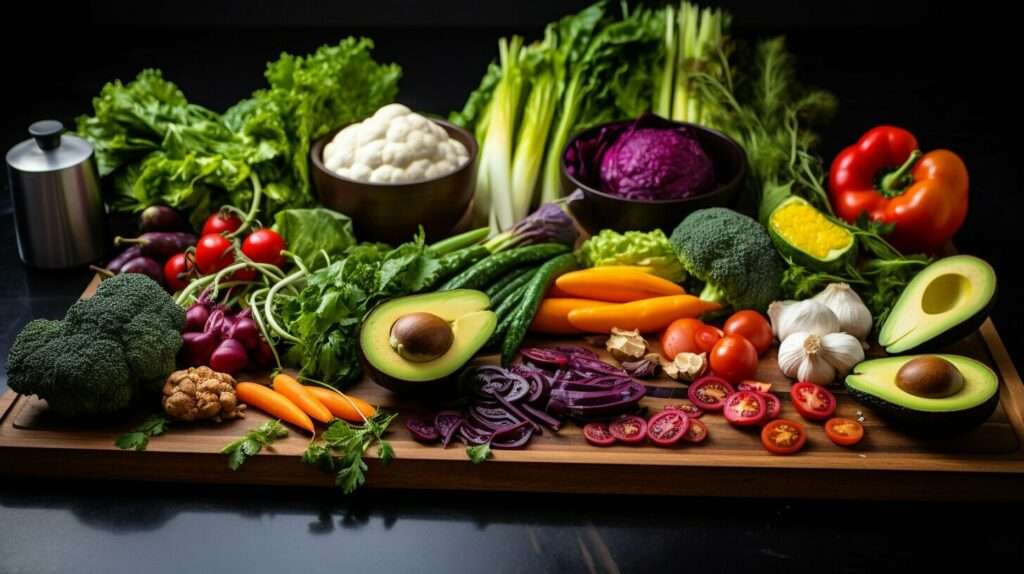Lowering blood pressure and cholesterol levels naturally is not only possible but can also lead to significant improvements in overall health and well-being.
By making simple lifestyle changes and adopting a healthy diet, you can effectively manage your blood pressure and cholesterol levels without relying on medication.
This guide will provide you with valuable information on natural ways to reduce blood pressure and lower cholesterol, along with practical tips and remedies that you can incorporate into your daily routine.
Key Takeaways:
- Avoid high-cholesterol foods that are typically high in saturated and trans fats.
- Adopt a plant-based diet rich in fruits, vegetables, and whole grains to effectively reduce LDL cholesterol levels.
- Incorporate regular exercise, quit smoking, maintain a healthy weight, and limit alcohol consumption to improve blood pressure and cholesterol numbers.
- Individuals with a family history of high cholesterol should monitor their cholesterol levels regularly and be mindful of their diet.
- Pay attention to triglyceride levels, as high triglycerides can increase the risk of heart attack and stroke.
By following these natural methods and making these lifestyle changes, you can take control of your health and effectively lower your blood pressure and cholesterol levels. In the following section, we will explore the impact of diet on cholesterol and how certain foods can affect your cholesterol numbers.
Understanding the Impact of Diet on Cholesterol
The food we consume plays a crucial role in our cholesterol levels, with certain foods being known to increase LDL cholesterol, also known as “bad” cholesterol.
It is important to be aware of high-cholesterol foods, particularly those that are high in saturated and trans fats, as they can contribute to elevated cholesterol levels.
Let’s take a closer look at some common high-cholesterol foods:
| Food | Cholesterol Content |
|---|---|
| Egg Yolks | 212mg per yolk |
| Processed Meats (e.g., sausages, bacon) | Varies, but typically high |
| Full-fat dairy Products (e.g., cheese, butter) | Varies, but typically high |
| Shellfish (e.g., shrimp, lobster) | Varies, but can be high |
Tip: To reduce your intake of saturated and trans fats, consider opting for lean protein sources such as skinless poultry, fish, and plant-based proteins like legumes and tofu. Incorporating more fruits, vegetables, and whole grains into your diet is also beneficial for cholesterol management.

By making informed dietary choices and being mindful of your cholesterol intake, you can take control of your cholesterol levels and improve your overall heart health.
Adopting a Plant-Based Diet for Healthy Cholesterol Levels
One effective way to naturally lower LDL cholesterol levels is by adopting a plant-based diet that is rich in fruits, vegetables, and whole grains. These foods are naturally low in saturated and trans fats, making them ideal choices for individuals looking to improve their cholesterol numbers.
Additionally, plant-based foods are high in fiber, which can help reduce cholesterol absorption in the body.
A plant-based diet consists of consuming a variety of colorful fruits and vegetables, such as berries, citrus fruits, leafy greens, and cruciferous vegetables.
These foods are packed with vitamins, minerals, and antioxidants that can contribute to overall heart health. Whole grains, such as oats, brown rice, and quinoa, are a great source of complex carbohydrates and fiber, helping to regulate cholesterol levels.
To create a well-rounded meal plan, consider incorporating plant-based proteins like legumes, tofu, and tempeh. These protein sources are low in saturated fats compared to animal-based proteins, making them a healthier choice for cholesterol management.
Additionally, incorporating healthy fats from sources like avocados, nuts, and seeds can provide essential nutrients and promote heart health.
By focusing on a plant-based diet, individuals can significantly lower their blood pressure and cholesterol levels naturally. This approach not only improves overall health but also offers a wide range of delicious and nutritious meal options.
Adopting a plant-based diet is a sustainable and enjoyable way to support heart health and maintain healthy cholesterol levels.

| Meal | Food Choices |
|---|---|
| Breakfast | Oatmeal with berries and sliced almonds |
| Lunch | Grilled vegetable salad with quinoa |
| Afternoon Snack | Carrot sticks with hummus |
| Dinner | Lentil curry with brown rice |
| Evening Snack | Handful of mixed nuts |
Remember to consult with a healthcare professional or registered dietitian before making any significant dietary changes, especially if you have specific health conditions or dietary restrictions. They can provide personalized guidance and support to help you achieve your health goals.
Lifestyle Changes to Improve Blood Pressure and Cholesterol
In addition to dietary changes, certain lifestyle modifications can significantly contribute to lower blood pressure and healthier cholesterol levels.
Regular exercise, quitting smoking, maintaining a healthy weight, and limiting alcohol consumption are all integral parts of a holistic approach to managing these important health markers.
Exercise, particularly aerobic activities such as brisk walking, cycling, or swimming, has been shown to have a positive impact on blood pressure and cholesterol levels.
Engaging in moderate-intensity exercise for at least 150 minutes per week, or vigorous-intensity exercise for 75 minutes per week, can help lower blood pressure and raise HDL (good) cholesterol levels while reducing LDL (bad) cholesterol and triglycerides.
Quitting smoking is another crucial step towards improving blood pressure and cholesterol numbers. Smoking damages blood vessels, causing them to narrow and making it harder for blood to flow freely.
This increases the risk of high blood pressure and heart disease. Quitting smoking can lead to immediate improvements in blood pressure and decreased risk of atherosclerosis.
Maintaining a healthy weight is also key to managing blood pressure and cholesterol. Excess weight, especially around the waist, increases the risk of high blood pressure and unfavorable cholesterol levels.
Losing as little as 5 to 10% of body weight can have a significant impact on blood pressure and cholesterol markers. A combination of healthy eating, physical activity, and portion control can help achieve and maintain a healthy weight for optimal cardiovascular health.
The Role of Alcohol Consumption
When it comes to alcohol consumption, moderation is key. While some studies have suggested that moderate alcohol intake, such as a glass of red wine, may have a positive effect on heart health, excessive alcohol consumption can raise blood pressure and triglyceride levels, leading to increased cardiovascular risk.
It is recommended to limit alcohol to moderate levels, which means up to one drink per day for women and up to two drinks per day for men.
By incorporating these lifestyle changes into your daily routine, you can take significant steps towards naturally lowering blood pressure and cholesterol levels.
Remember to consult with your healthcare provider before making any significant changes, especially if you have any underlying medical conditions or are taking prescription medications.

| Lifestyle Changes | Impact on Blood Pressure and Cholesterol |
|---|---|
| Regular Exercise | Reduces blood pressure, raises HDL cholesterol, and lowers LDL cholesterol and triglycerides. |
| Quitting Smoking | Improves blood pressure and decreases the risk of atherosclerosis. |
| Maintaining a Healthy Weight | Reduces the risk of high blood pressure and unfavorable cholesterol levels. |
| Limiting Alcohol Consumption | Moderate alcohol intake may have a positive effect, but excessive consumption can raise blood pressure and triglyceride levels. |
Monitoring Cholesterol Levels and Family History
Individuals with a family history of high cholesterol should be particularly vigilant in monitoring their cholesterol levels to ensure early detection and appropriate management. Regular cholesterol level checks play a crucial role in assessing one’s risk for heart disease and other cardiovascular conditions.
By keeping a close eye on cholesterol numbers, individuals can take proactive steps to prevent potential health complications.
When it comes to monitoring cholesterol levels, it is recommended to have a comprehensive lipid profile done. This test measures different types of cholesterol, including total cholesterol, LDL (low-density lipoprotein) cholesterol, HDL (high-density lipoprotein) cholesterol, and triglycerides.
The results of these tests can provide valuable insights into an individual’s cholesterol profile and guide appropriate intervention strategies.
For individuals with a family history of high cholesterol, it is important to have cholesterol levels checked regularly, ideally starting from an early age.
The frequency of testing may vary depending on individual risk factors, such as age, overall health, and medical history. Consulting with a healthcare professional is essential to determine the appropriate testing schedule.
| Cholesterol Component | Desirable Levels |
|---|---|
| Total Cholesterol | Less than 200 mg/dL |
| LDL Cholesterol | Less than 100 mg/dL |
| HDL Cholesterol | More than 40 mg/dL (men); more than 50 mg/dL (women) |
| Triglycerides | Less than 150 mg/dL |
By staying proactive and regularly monitoring cholesterol levels, individuals can identify any potential deviations from desirable levels and take necessary actions to manage their cardiovascular health effectively.
Triglycerides and their Impact on Heart Health
While cholesterol often takes the spotlight, it’s important not to overlook the significance of triglyceride levels in maintaining a healthy heart.
Triglycerides are a type of fat found in the blood, and high levels can increase the risk of heart attack and stroke. To effectively manage blood pressure and cholesterol, it’s crucial to pay attention to triglyceride levels and take appropriate measures to keep them in check.
One of the key ways to lower triglyceride levels is by adopting a healthy lifestyle. Regular exercise plays a crucial role in reducing triglycerides, as it helps burn excess calories and fat.
Aim for at least 150 minutes of moderate-intensity aerobic activity every week, such as brisk walking, cycling, or swimming.
| Recommended Exercises | Frequency | Duration |
|---|---|---|
| Brisk walking | 5 days a week | 30 minutes |
| Cycling | 3 days a week | 45 minutes |
| Swimming | 2 days a week | 60 minutes |
Additionally, making dietary changes can have a significant impact on triglyceride levels. Avoiding sugary and processed foods, and opting for a diet rich in fruits, vegetables, whole grains, and lean proteins can help lower triglycerides. Incorporating heart-healthy fats, such as those found in avocados, nuts, and olive oil, can also be beneficial.
It’s important to remember that managing triglycerides and promoting heart health is a holistic approach. Alongside exercise and a healthy diet, weight management, stress reduction techniques, and regular health check-ups are equally important.
By integrating these changes into our daily routines, we can effectively lower blood pressure, cholesterol, and triglyceride levels, ultimately reducing the risk of heart disease.

The path to reducing blood pressure naturally involves incorporating specific lifestyle changes that can have a significant positive impact on overall cardiovascular health.
One of the most effective ways to lower blood pressure is through regular exercise. Engaging in moderate-intensity activities for at least 150 minutes per week, such as brisk walking, swimming, or cycling, can help strengthen the heart and improve blood flow.
Maintaining a healthy weight is also crucial in managing blood pressure. Losing excess weight can reduce the strain on the heart and arteries, leading to lower blood pressure levels.
Adopting a balanced diet that includes a variety of fruits, vegetables, whole grains, and lean proteins is key. These foods are naturally low in sodium, which can help control blood pressure.
Stress management techniques are another important aspect of lowering blood pressure naturally. Chronic stress can contribute to high blood pressure, so finding healthy ways to cope with stress is vital.
Activities such as meditation, deep breathing exercises, and practicing mindfulness can all help reduce stress levels and promote a sense of calm.
| Lifestyle Changes for Healthy Blood Pressure | How it Helps |
|---|---|
| Regular exercise | Strengthens the heart and improves blood flow |
| Maintaining a healthy weight | Reduces strain on the heart and arteries |
| Adopting a balanced diet | Naturally low in sodium, helps control blood pressure |
| Stress management techniques | Reduces stress levels and promotes calm |

By making these lifestyle modifications a priority, individuals can work towards lowering their blood pressure naturally.
It is important to note that these changes may take time to show results, and consistency is key. Consulting with a healthcare professional before starting any new exercise or dietary regimen is advised, as they can provide personalized guidance and support.
Holistic Approaches to Blood Pressure and Cholesterol Management
In addition to traditional methods, holistic approaches can offer valuable tools for effectively managing blood pressure and cholesterol levels naturally. By incorporating stress reduction techniques, complementary therapies, and mindfulness practices into your routine, you can enhance the effectiveness of lifestyle changes and dietary choices.
Stress reduction techniques, such as deep breathing exercises, meditation, and yoga, can help lower blood pressure and reduce cholesterol levels.
Chronic stress can contribute to high blood pressure and unhealthy cholesterol levels, so finding healthy ways to manage stress is crucial. Taking time for self-care, engaging in hobbies, and prioritizing relaxation can all contribute to a more balanced and calm state of mind.
Complementary therapies, such as acupuncture, massage therapy, and herbal supplements, can also play a role in managing blood pressure and cholesterol naturally.
These therapies are designed to promote overall well-being and balance in the body, which can have a positive impact on heart health. It’s important to consult with a qualified practitioner before incorporating any complementary therapies into your routine.

Finally, mindfulness practices, such as mindful eating and mindful movement, can enhance the effectiveness of dietary changes in managing blood pressure and cholesterol.
By being fully present and aware of your eating habits and exercise routines, you can make more conscious choices that promote heart health. This can include savoring each bite, eating slowly, and listening to your body’s hunger and fullness cues.
Combining these holistic approaches with the recommended lifestyle changes, dietary modifications, and natural supplements discussed in previous sections can provide a comprehensive and effective strategy for naturally lowering blood pressure and cholesterol levels.
By taking a holistic approach to your health, you can optimize your heart health and improve your overall well-being.
The Role of Natural Supplements in Blood Pressure and Cholesterol Management
Natural supplements can be a valuable addition to lifestyle changes when it comes to effectively managing blood pressure and cholesterol levels.
While a healthy diet and regular exercise play crucial roles in maintaining cardiovascular health, certain supplements can enhance these efforts.
It is important to note that natural supplements should be used in consultation with a healthcare professional, as they may interact with medications or have contraindications for certain individuals.
One popular natural supplement for blood pressure management is garlic extract. Garlic has been used for centuries due to its potential benefits for cardiovascular health. It is believed to help lower blood pressure by dilating blood vessels and reducing inflammation. However, it is important to choose standardized garlic supplements to ensure consistent quality and potency.
Fish oil supplements, rich in omega-3 fatty acids, are known for their potential to improve heart health by reducing triglyceride levels. Omega-3s are essential fats that have been shown to have anti-inflammatory properties and may help lower blood pressure and cholesterol levels. Individuals interested in taking fish oil supplements should look for products that are purified to remove contaminants, such as mercury.
| Supplement | Potential Benefits |
|---|---|
| Garlic extract | – Lowering blood pressure – Reducing inflammation |
| Fish oil supplements | – Lowering triglyceride levels – Anti-inflammatory properties |
| Plant sterols and stanols | – Reducing LDL cholesterol levels – Blocking cholesterol absorption |
Plant sterols and stanols are another type of supplement that may help lower cholesterol levels. These compounds are naturally found in plant-based foods and are known to reduce LDL cholesterol, also known as “bad” cholesterol. They work by blocking the absorption of cholesterol in the intestines.
Plant sterols and stanols can be found in supplement form or added to certain food products like margarine and orange juice.
It is important to remember that natural supplements should not replace a healthy lifestyle but rather complement it. They should be used as part of a comprehensive approach to managing blood pressure and cholesterol levels.
Consulting with a healthcare professional is crucial to ensure the supplements are safe and appropriate for individual circumstances. By combining lifestyle changes with natural supplements, individuals can take proactive steps toward maintaining optimal cardiovascular health.

Lowering blood pressure and cholesterol naturally requires a multifaceted approach that encompasses dietary changes, lifestyle modifications, and, when appropriate, the integration of natural supplements.
By combining these strategies, individuals can effectively manage their blood pressure and cholesterol levels, promoting overall heart health.
A key aspect of this comprehensive approach is adopting a healthy diet. Consuming foods that are low in saturated and trans fats can help reduce LDL cholesterol levels.
Foods high in saturated fats, such as red meat and full-fat dairy products, should be limited, while healthier alternatives like lean proteins, whole grains, fruits, and vegetables should be emphasized.
In addition to dietary changes, making lifestyle modifications can have a significant impact on blood pressure and cholesterol. Regular physical exercise, such as aerobic activities or strength training, can help lower blood pressure and increase HDL cholesterol levels.
Quitting smoking, maintaining a healthy weight, and limiting alcohol consumption are also crucial for improving heart health.
Monitoring cholesterol levels regularly, particularly for individuals with a family history of high cholesterol, is essential in managing blood pressure and cholesterol naturally.
It is recommended to have cholesterol levels checked at least once every five years for adults above the age of 20. By staying proactive and aware of their cholesterol numbers, individuals can take appropriate steps to maintain optimal heart health.
| Lifestyle Changes | Natural Ways to Reduce Blood Pressure and Cholesterol | Natural Remedies for High Cholesterol | Natural Supplements for Blood Pressure and Cholesterol Management |
|---|---|---|---|
| Regular exercise | Avoiding high-cholesterol foods | Consuming plant-based food | Fish oil supplements |
| Quitting smoking | Limiting saturated and trans fats | Using garlic supplements | Red yeast rice extract |
| Maintaining a healthy weight | Incorporating more fruits and vegetables | Red yeast rice supplements | Niacin supplements |
| Limiting alcohol consumption | Choosing whole grains over refined grains | Green tea extract | Coenzyme Q10 supplements |
“Lowering blood pressure and cholesterol naturally requires a multifaceted approach that encompasses dietary changes, lifestyle modifications, and, when appropriate, the integration of natural supplements.”
Integrating these lifestyle changes, dietary choices, and natural supplements into a comprehensive approach can bring about significant improvements in blood pressure and cholesterol levels.
However, it’s important to consult with a healthcare professional before starting any new dietary or supplement regimen to ensure it is appropriate for individual needs and overall health.

Conclusion
By adopting a balanced approach that includes dietary changes, lifestyle modifications, and natural supplements, you can take control of your blood pressure and cholesterol levels naturally. Start making these positive changes today for a healthier future.
Lowering blood pressure and cholesterol levels naturally can be achieved through various lifestyle changes and dietary choices.
It is important to understand the impact of certain foods on cholesterol levels, with a particular focus on saturated and trans fats. High-cholesterol foods are often high in saturated fats, so it is recommended to limit their consumption.
A plant-based diet rich in fruits, vegetables, and whole grains can significantly lower LDL cholesterol levels. Additionally, lifestyle changes such as regular exercise, quitting smoking, maintaining a healthy weight, and limiting alcohol consumption can improve cholesterol numbers.
Individuals with a family history of high cholesterol should be more mindful of their diet and have their cholesterol levels checked regularly. It is also important to pay attention to triglyceride levels, as high triglycerides can increase the risk of heart attack and stroke.
Overall, integrating these changes into one’s daily routine are effective way to naturally lower blood pressure and cholesterol levels.
FAQ
Q: How can I lower my blood pressure and cholesterol naturally?
A: Lowering blood pressure and cholesterol naturally can be achieved through various lifestyle changes and dietary choices. These include adopting a healthy diet, exercising regularly, quitting smoking, maintaining a healthy weight, limiting alcohol consumption, and monitoring cholesterol levels. Integrating these changes into your daily routine can help improve your blood pressure and cholesterol numbers.
Q: What impact does diet have on cholesterol levels?
A: Diet plays a significant role in managing cholesterol levels. Certain foods, particularly those high in saturated and trans fats, can increase cholesterol numbers. It is important to limit the consumption of high-cholesterol foods and focus on a plant-based diet rich in fruits, vegetables, and whole grains to lower LDL cholesterol levels naturally.
Q: How does a plant-based diet help lower cholesterol?
A: A plant-based diet is beneficial for lowering cholesterol levels as it is naturally low in saturated fats and high in fiber. Fruits, vegetables, and whole grains contain nutrients that can help reduce LDL cholesterol. By incorporating more plant-based foods into your meals, you can improve your cholesterol profile and promote heart health.
Q: What lifestyle changes can I make to improve blood pressure and cholesterol?
A: Several lifestyle changes can help improve blood pressure and cholesterol levels. Regular exercise, quitting smoking, maintaining a healthy weight, and limiting alcohol consumption are all effective strategies. By making these changes, you can lower your risk of heart disease and improve your overall cardiovascular health.
Q: Why is monitoring cholesterol levels important, especially for those with a family history of high cholesterol?
A: Monitoring cholesterol levels is important, particularly for individuals with a family history of high cholesterol. While adopting a healthy lifestyle is crucial for managing cholesterol, genetic factors can also influence cholesterol levels. Regular check-ups allow you to track your cholesterol numbers and take appropriate actions if needed.
Q: What is the impact of triglycerides on heart health?
A: High triglyceride levels can increase the risk of heart attack and stroke. It is important to manage triglyceride levels along with cholesterol levels for optimal heart health. A healthy diet, regular exercise, and limiting alcohol consumption can help lower triglycerides and reduce the risk of cardiovascular complications.
Q: What are some lifestyle modifications specifically aimed at lowering blood pressure?
A: To lower blood pressure, it is recommended to engage in regular exercise, maintain a healthy weight, and manage stress effectively. These lifestyle modifications can help to keep blood pressure within a healthy range and reduce the risk of hypertension-related complications.
Q: Are there holistic approaches to blood pressure and cholesterol management?
A: Yes, holistic approaches can be used to manage blood pressure and cholesterol levels. Stress reduction techniques, complementary therapies, and mindfulness practices have shown positive effects in promoting heart health. These approaches can be used in combination with lifestyle changes and dietary modifications for optimal results.
Q: What is the role of natural supplements in blood pressure and cholesterol management?
A: Natural supplements can play a supportive role in blood pressure and cholesterol management. However, it is important to consult with a healthcare professional before starting any supplements. Commonly used supplements for blood pressure and cholesterol management include omega-3 fatty acids, garlic, and plant sterols. These supplements may provide additional benefits when combined with a healthy lifestyle.
Q: How can I combine multiple strategies for naturally lowering blood pressure and cholesterol?
A: To naturally lower blood pressure and cholesterol, it is important to combine multiple strategies. This includes adopting a healthy diet, exercising regularly, quitting smoking, maintaining a healthy weight, limiting alcohol consumption, monitoring cholesterol levels, managing stress, and considering natural supplements. By integrating these strategies into your daily routine, you can achieve optimal results in improving your blood pressure and cholesterol numbers.






